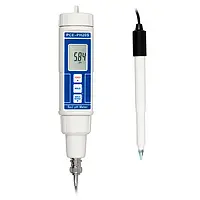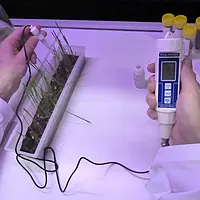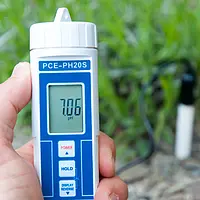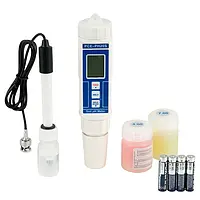




Easy to use, for determining the pH value of soil, with external pH electrode, can be recalibrated and is waterproof (IP67)
The pH meter for soil has been developed with the purpose of finding an effective method for directly determining the pH value of soil. With the help of this pH meter, it is possible to quickly and accurately measure the pH value of soil or a soil sample taken from the ground.
To do this, simply insert the electrode into loose soil and read the pH value on the digital display. Please take into account that the first measurement requires there to be moisture in the soil. The device comes calibrated by the manufacturer. The pH meter can be recalibrated by using the calibration solutions that come with the device. Calibration data remains stored in the device even when the batteries have been changed.
**Care must be taken when inserting probe to not break it**
pH is one of the essential parameters which influences and determines the normal functioning of many processes in nature, industry and agriculture. Besides climate, weather conditions, types of plants, area, annual precipitation, one of the important factors that is taken into consideration at any agrochemical analysis is the quality of soil and its pH parameter, in particular. Acidity of the soil is a pledge of a “good life” of crops and plants growing there. Besides, it determines also the life conditions for microorganisms, the presence of which may have both, positive and negative effects on the process of growing of trees, vegetables, crops, berries, bushes etc. even the quality of the hay used for cattle and livestock depends on the acidity of the soil, since the amount of nutrients, vitamins, proteins and valuable minerals contained in the soil and enriching the plants in the process of their growth, significantly fluctuates depending on the fluctuation of the pH level. For example, if the acidity level increases too much, the valuable elements cannot reach the plants and won’t be absorbed in the necessary amounts.
The farmers who neglect the usage of the auxiliary equipment for regular monitoring of the pH level of the soil take huge risks, since the damage from that may go beyond expectations. The pH level of soil is not an unchangeable parameter, and it may fluctuate because of different reasons. The positive side is that it can be influenced and regulated by different measures (supplementary minerals, correct choice of plants for particular soils, longer time periods between planting, ash, humus, compost application etc.). 

Application of the pH meter for soil saves a lot of time, efforts, complicated calculations and, which is the most important, a lot of trouble that may be caused by the fluctuation of the pH value in the soil and lead to immense losses of crops and subsequently, huge financial losses.
| Measurement range | 0.00 to 14.00pH |
| Resolution | 0.01pH |
| Accuracy | ±0.07pH (between 5 and 9pH) ±0.1pH (from 4 to 4.9 and 9.1 to 10pH) ±0.2pH (from 1 to 3.9 and 10 to 13pH) |
| Calibration | automatic, depending on the calibration solution pH value of 4, 7 or 10 |
| Electrode | pH electrode with glass casing |
| Power | 4 AAA batteries |
| Operating conditions | 0 to 60 ºC / 32 ºF to 140 ºF <80% r.h. |
| Dimensions | 180 mm x 40 mm 7.1 in x 1.6 in |
| Weight | 220 g / 0.58 lbs |